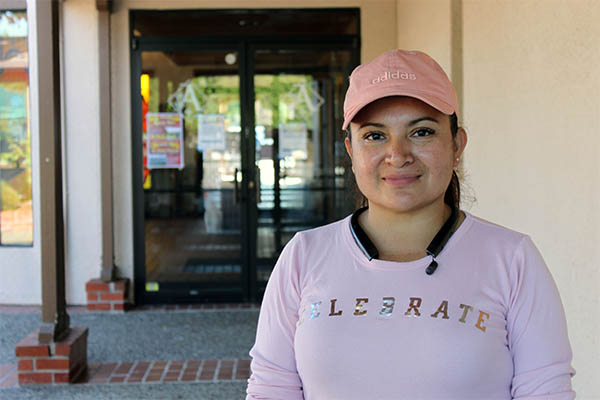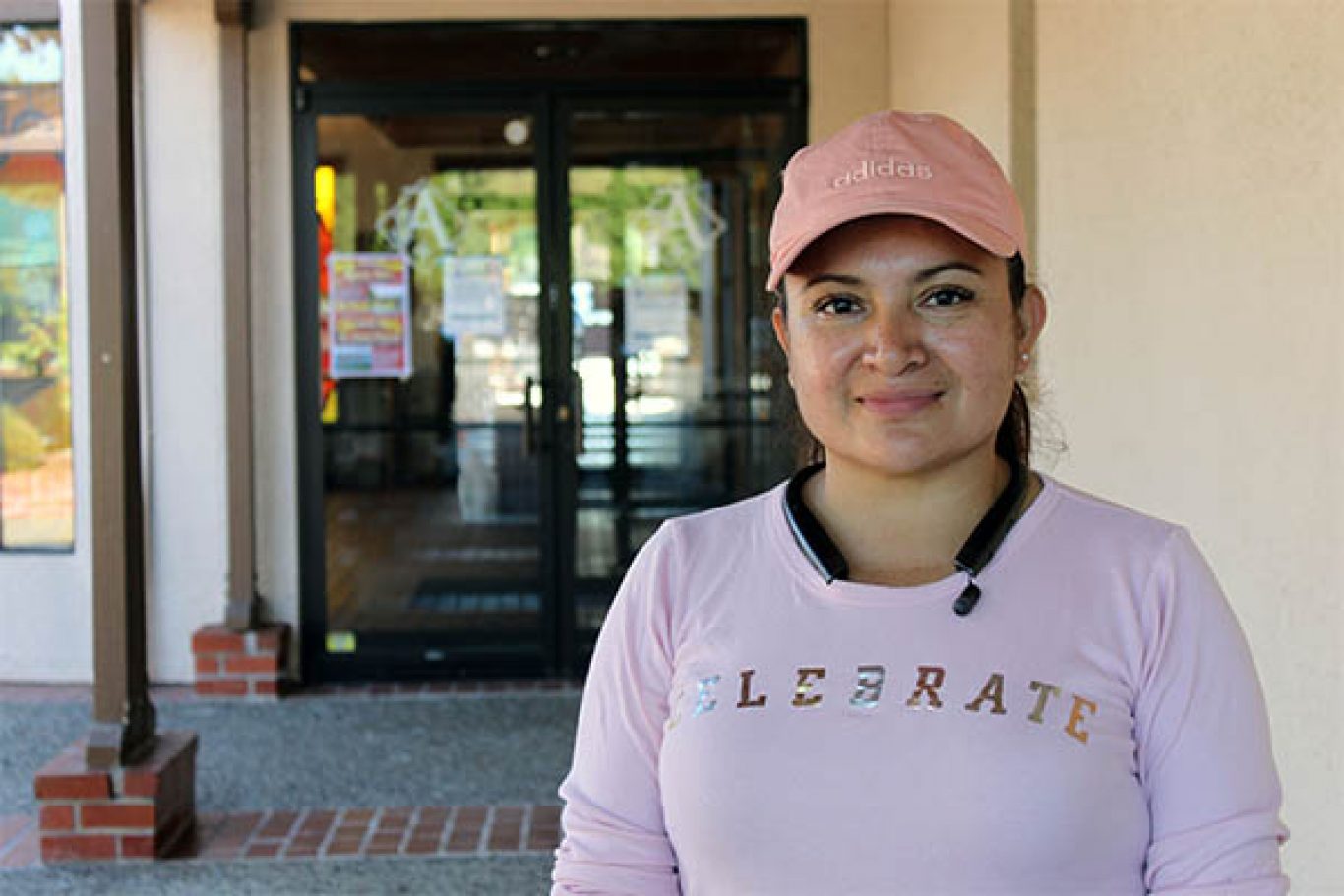Community Connection: Lourdez Monica Estrada Garcia
Community Connection: Lourdez Monica Estrada Garcia

My name is Lourdez Monica Estrada Garcia and I’m 46 years old.
I arrived in the United States in the year 2000 but we arrived in Arizona. We lived there 10 years and my daughters were born there. Then in 2010 we moved to Oregon and we are still living in the place we first arrived to.
In Arizona I was a parent volunteer at my daughters school, I used to help the teachers. In Oregon I also started out volunteering at my youngest daughter’s school and I slowly became more involved. I met Angelica (Angelica received the 2019 Oregon Food Bank Hunger Hero Award). When I met her she invited me to get involved with Growing Gardens and then I also started volunteering at a food distribution at my daughter’s school every Thursday.
Angelica told me I could be a mentor with Growing Gardens and we’ve been very involved. We help people who want to have gardens, we invite them and help them start their gardens. Then I became a facilitator for the Seed to Supper program at Oregon Food Bank. I’ve been volunteering with Oregon Food Bank for about 2 years. We had a good experience with the last couple of people we were able to teach through Seed to Supper. It was so practical, we could garden and teach at the same time.
We’re a little discouraged by this pandemic but we are confronting it. It has affected us because we can no longer attend meetings in person, we can’t plan events and we only know each other virtually now. We only know the new volunteers by name.
It has also affected my community because Latino people work as essential workers, they work in gardens, hotels, restaurants, construction and many work in grocery stores. If the Latino community has an identifying trait it is that we are hard workers but we’ve been impacted, many have lost jobs or have lost hours. If someone is sick at home they have to stay home from work so they won’t expose their co-workers but many Latino families don’t have health insurance so their bills get bigger and their debt gets bigger but that motivates me to help my community because at least I can offer then a box full of food and let them know that they don’t have to experience hunger.
We have organized food distributions with a group of volunteers like myself and a church with a high Latino population. Many families come, it is an open space with low risk of infection. I help arrange boxes and deliver them without contact. We try to make it as easy as possible so people don’t even have to get out of their cars. We distribute about 100 boxes every distribution with the help of Oregon Food Bank and another organization.
We started this distribution about two months after the pandemic began. This distribution is important because we want to encourage the church community to get involved and we want to develop more community leaders. We want them to see that volunteer work is not a waste of time even if you are not being paid, it is important because that is the only way they can realize how strong our community can be. We can make a difference through unity and solidarity.
Sometimes you have to lead by example and I’m not saying that I am an exemplary woman but when you work with the community you will see what the needs are and you will be able to advocate.
This work is important because a lot of people start as volunteers and they begin to see the problems our communities face, the shortfalls and all the other problems. From there we can begin to make suggestions to create solutions. Knowing our community will help us realize that there are big problems and if no one speaks up we will not be heard.
I am motivated to do this work because of the satisfaction I have from being a volunteer. I am not waiting for a paycheck, I do this work with a smile and I want to help everyone. I really do this with all my heart. I want to give my children an example – we don’t have to be selfish.
Vecinos en Accion: Lourdez Monica Estrada Garcia

Mi nombre es Lourdez Monica Estrada Garcia, tengo 46 años.
Yo llegue en el año 2000 a Estados Unidos pero llegué a Arizona. Ahí vivimos durante 10 años y mis hijas nacieron ahí. Y en el año 2010 nos mudamos a Oregon. Desde entonces no nos hemos movido del lugar donde llegamos a vivir.
En Arizona era padre voluntaria en las escuelas de mis hijas, ayudando a los maestros. También en Oregon empecé en la escuela de mi niña más pequeña y me fui involucrando más. Después me fui comunicando con Angelica (Angelica fue recipiente del reconocimiento Hunger Hero 2019). Cuando la conocí ella me invitó a estar involucrada en Growing Gardens y ya después en la misma escuela empecé a hacer voluntaria después de clases los jueves, sirviendo comida.
Angelica me dijo que podía ser mentora en Growing Gardens y hemos estado involucradas más el último año ayudando a las personas que quieren tener un jardín, invitandolas, ayudándoles a formar su jardín. Y ya después fui facilitadora de clases de Siembra la Cena [Seed to Supper] para Oregon Food Bank. Llevo participando con Oregon Food Bank 2 años. Las poquitas personas que se presentaron a las últimas clases de Siembra la Cena si las pudimos exponer. Era práctico, al mismo tiempo que enseñabamos trabajabamos en el jardín.
Nos desanima la pandemia y lo estamos enfrentando. Nos ha afectado porque ya no puede estar uno en reuniones para planificar eventos, solamente virtual y no es lo mismo porque apenas empezábamos a conocer los voluntarios y a veces solo los conoces por nombre.
Ha afectado mi comunidad porque las personas Latinas trabajan haciendo trabajo esencial, jardinería, hoteles, restaurantes, construcción, muchos son trabajadores en tiendas. Si tiene un rasgo la comunidad Latina es que son muy trabajadas y les ha impactado el perder su trabajo, perder horas de trabajo. Si alguien en su hogar está enfermo ellos tienen que perder días para no poner en riesgo sus compañeros de trabajo pero muchos Latinos no tienen seguro médico y se van haciendo los biles más grandes, las deudas más grandes y eso me motiva más a ayudar a las personas por lo menos para ayudarles a acercarles una caja de comida y dejarles saber que no se tienen que quedar sin comer.
Un grupo de voluntarios como yo hemos estado organizando distribuciones de comida en una iglesia donde acuden muchos Latinos. Muchas familias acuden, es un lugar abierto, sin riesgo de contagiarse. Acomodo cajas sin tener contacto directo con las personas. Trato de hacerlo lo más sencillo para que no se bajen del carro. Hemos donado hasta 100 cajas de comida del banco y otra organización.
La distribución empezó ahora que empezó la pandemia, como dos meses después. Esta distribución es importante porque queremos involucrar la comunidad de esa iglesia para que participen y salgan más líderes y que no digan que es perdida de tiempo o no me pagan. Es importante que se involucren porque solo así van a saber que tan fuerte es la comunidad Latina y que se puede hacer con unión y solidaridad.
A veces uno predica con el ejemplo y no digo que soy una mujer ejemplar pero a veces conociendo la comunidad y sabiendo las carencias es como aboga.
Este trabajo es importante porque mucha gente empieza como voluntaria y empieza a conocer más a fondo los problemas de la comunidad, sus carencias, los problemas. También pueden hacer sugerencias de soluciones – conociendo la comunidad se da uno cuenta que hay problemas muy grandes y si nadie lo dice nadie lo toma en cuenta.
Mi motivación es porque uno le tiende la mano a los más necesitados y es la satisfacción de poder ser voluntario. No estamos esperando a que nos paguen, con una sonrisa ayudamos a todos. Yo lo hago de mucho corazón. Uno puede dar el ejemplo a nuestros hijos. No hay que ser egoistas.
